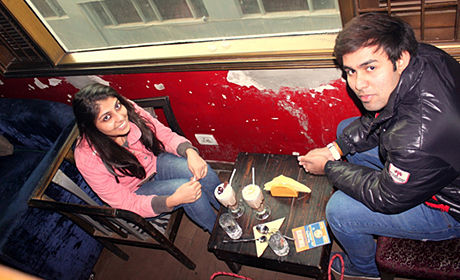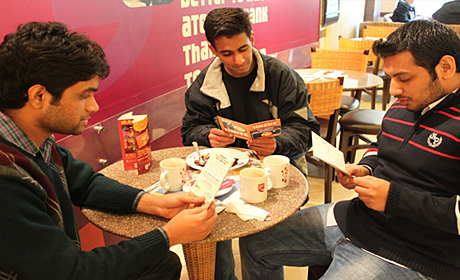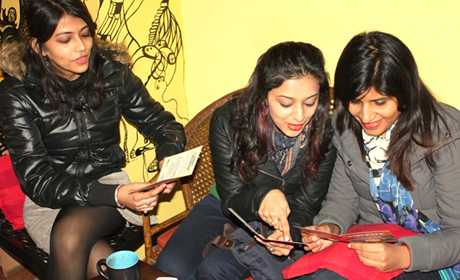Freedom from Violence photo competition strikes a chord amongst young Indians
Date:
New Delhi - Srishti is a 20-year-old Delhi student who feels unsafe when she travels out of her house. “I have started carrying pepper spray to protect myself. My parents have become more protective, they want to know where I’m going, when I’ll be back and with who I’m hanging out with,” she says.
On 9 December 2012, UN Women launched an India wide on-ground and social media campaign to increase awareness about violence against women and girls. The campaign, which is part of the UN Secretary General’s campaign to End Violence Against Women, encourages young people to discuss and speak out about violence. The ongoing campaign has reached an estimated 3 million people through on-ground actions.
Speaking of the campaign at a cafe in Delhi, Radhika and Pallavi said: “Such movements or activities at least get people to start thinking or approaching the problem by spreading awareness.”
Aishwarya feels that these initiatives are important as there is a need to ‘trendify’ the concept of women equality and empowerment amongst the youth.
The UNiTE campaign in India: Using photos to make a difference
The Freedom from Violence photo competition was one part of the campaign where young people were invited to take photos on the theme and post them on UN Women India’s Facebook page. In their captions, they were encouraged to talk about the action that could prevent violence. So far almost 200 photo entries have been received.
Two phases create momentum
In Phase 1 of the campaign, 50,000 offline contest cards were distributed in 12 Cities, and over 500 locations including over 150 Premium Barista and Café Coffee Day outlets engaging 1.5 million people. 400 top plates were extended to the end of the contest on 10 February catching the attention of over 2 million visitors to selected venues.
In Phase 2 of the campaign, 60,000 YES I Can Stop Violence cards were distributed throughout January with an immediate high pick up rate. “This card has generated significant engagement as reflected in our Facebook insights, phone calls and specific feedback. We have reached almost 1.5 million people through this mature, affirmative and highly relevant message. Through the postcards, young people were also urged to start or join an action on UN Women’s Say No to Violence social media platform,” says Sabrina Sidhu, Communications and Information Officer, UN Women.
The power of Facebook
As the movement gained momentum, people came forward on ground and on Facebook with opinions and supported it with full enthusiasm. One supporter on UN Women India’s Facebook page is Koko Blush.“I say Amen to teaching sons and men to respect every girl & woman. This is beautiful,” she exclaims.
In 2 months alone, over 12,000 people started following the campaign on Facebook, and in one particular week in January, almost 400,000 people were reached through the social media platform. Young girls between 18 and 24 years of age were most active, reflecting their strong interest in the issue, UN Women’s activities and the photo contest. They were optimistic about the prospects of change by citing the example of the proposed Protection of Women against Sexual Harassment at Workplace Bill, 2010, which is waiting to be passed by Rajya Sabha.
The power of the youth
Recently, the media has reported the Indian youth as being pro- active and passionate towards this sensitive issue of violence against women.

Shresth, a 20-year-old student studying at Delhi University said: “Only the youth can bring about a change in the country. Empowering the youth and promoting them to enter politics so that their voices can be heard is the need of the hour.”

When questioned about how change is possible, Ekant, 24 replied, “I would teach my children how to respect women and girls by inculcating values and manners that are in sync with the norms of the society.”
Sunil, 25, said,” Education is the key to social change we need to highlight the role of parentand schools as instruments for social change.”

With thousands of postcards being picked up in various locations throughout India, the campaign has created a great momentum on the ground and social media. Photo Credits- Sarthak Karol
Radhika Anand, 21 feels that discrimination, harassment and violence isexperienced by many women, and that contrary to popular myths, it is not only the poor that commit crimes and violence against women. “The problem of gender discrimination and male patriarchy is universal and it requires collective efforts,” she says.
Bringing a change
UN Women hopes that this competition can bring about a change in the society through empowering pictures of women and girls. “The photos that young people are submitting represent what young people want and desire – it evokes their sentiments about freedom from violence against women,” says Anne F Ms Stenhammer, Representative of UN Women India Bhutan Maldives and Sri Lanka.
Winners will be announced by end February and a photo exhibit will also be held in New Delhi featuring these photos.
See photo of the campaign: https://www.flickr.com/photos/unwomenasiapacific/sets/72157632790706655/